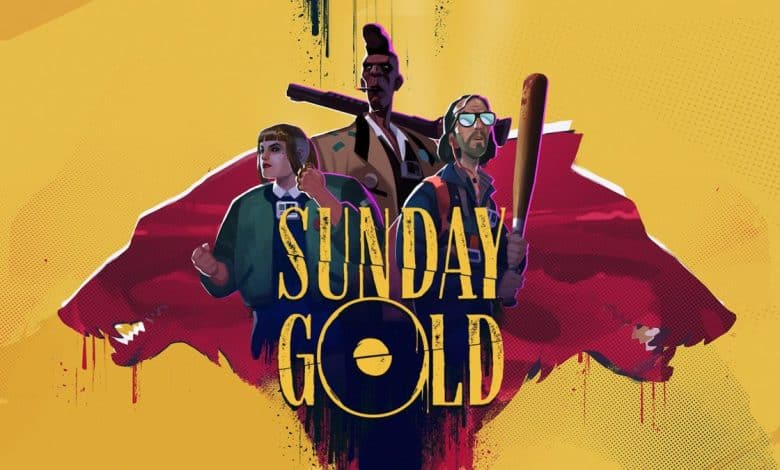
SUNDAY GOLD
The fact is that there are few new ideas being applied to gaming anymore. The main reason is that most companies don't want to take risks with big innovations for fear of financial failure, so they prefer to wander down safely on tried and tested paths. Of course, we are mainly referring to AAA productions, as the indie scene is still trying new things or, more commonly, implementing an amalgam of already known ideas in order to create a new and interesting proposal. In the latter category belongs BKOM Studios' Sunday Gold, which shuffles the deck of different, not so disparate genres and unites them under one roof, presenting a peculiar hybrid of adventure, tactical and... JRPG.
It may sound too ambitious as an idea, however, this mashup not as...confused as one might think. After all, its appearance is enough to draw a lot of attention to itself. With a particular stylistic approach, reminiscent of a comic-book and the choice of a dystopian version of London in 2070 as the main setting, if anything, it creates great expectations. All the more so when the protagonists of the story are three "professional" outlaws, who could easily be involved in a Guy Ritchie film like Lock, Stock and Two Smoking Barrels. The story begins when Frank Barber, a guy who has never worked an honest day in his life, meets his friend Sally, a tough-as-nails boxer, at the local pub. Sally, who is the brains of the outfit despite her fierce appearance, informs Frank that she has an advantageous proposition from a former employee of Kenny Hogan, the famous billionaire who basically controls the whole of London.
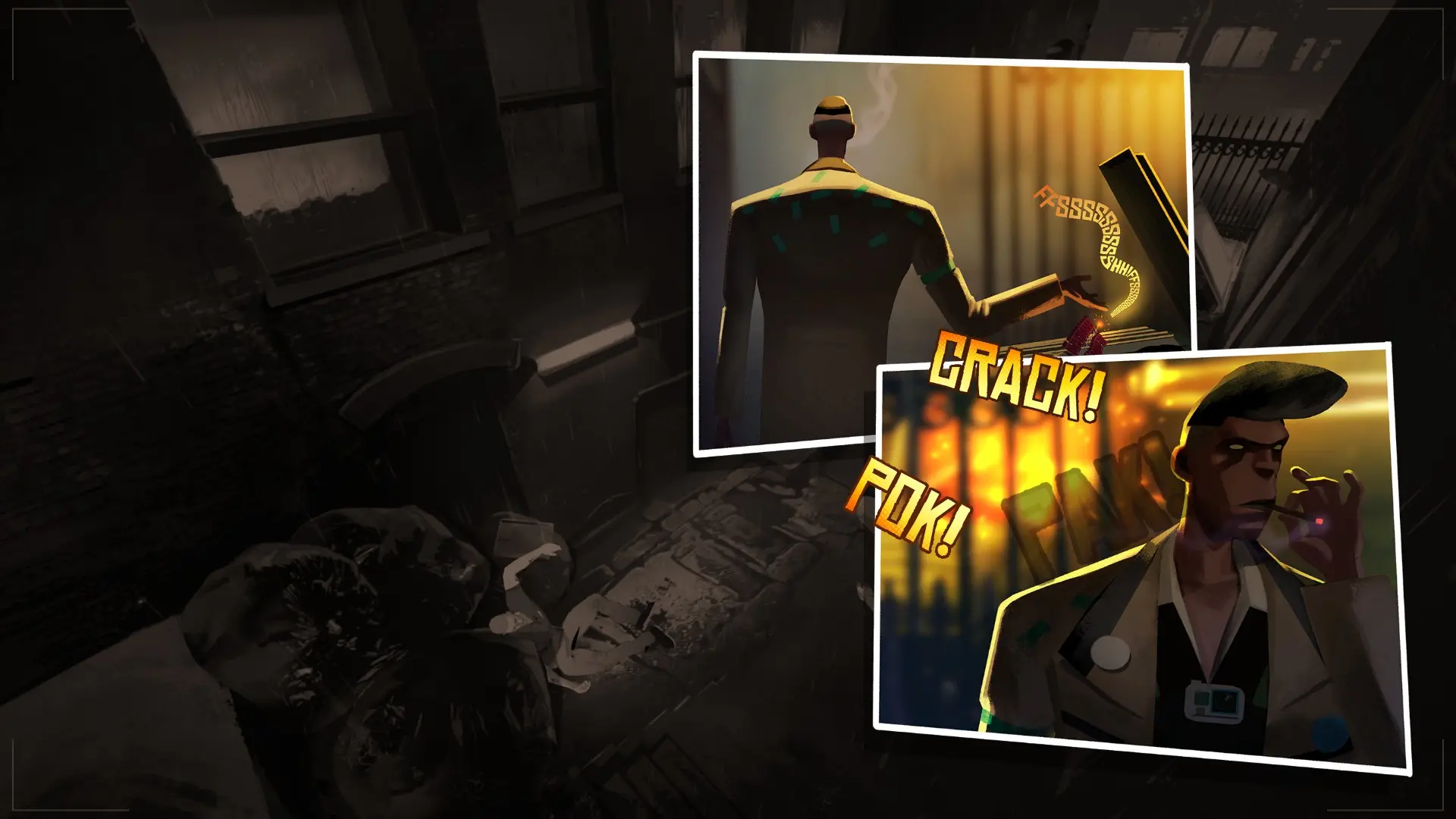
The ex-employee in question is Gavin, an IT guy, full of phobias and complexes, who claims he can find evidence that will "burn" Kenny Hogan's image to the public. Initially, Frank had misgivings about how much his pocket would benefit from this story, but Gavin assures that many people on the dark web would pay tens of thousands of pounds to get their hands on this information. So music to the ears for both Frank and Sally, except there's one small problem: Gavin no longer has access to Hogan's company premises, having just been fired, and the data he needs is sealed on their servers. Consequently, they'll have to break into the building at night and download it, hoping to avoid being spotted by security.
Predictably, things will NOT go well, and the shocking clues they discover about the who of Kenny Hogan's "hidden" activities would not even cross their minds. In summary, this is the premise of the game, the "adventure" part if you will, which is well developed, visualized in the form of a comic-book (as mentioned above) and several lines of dialogue, featuring a highly phlegmatic and at times intense black humor. Occasionally we'll be asked to interact with various characters, choosing our responses through a dialogue-tree, but these instances are few and far between. Most of the game is taken up by the tactical/RPG elements, which are also quite interesting.
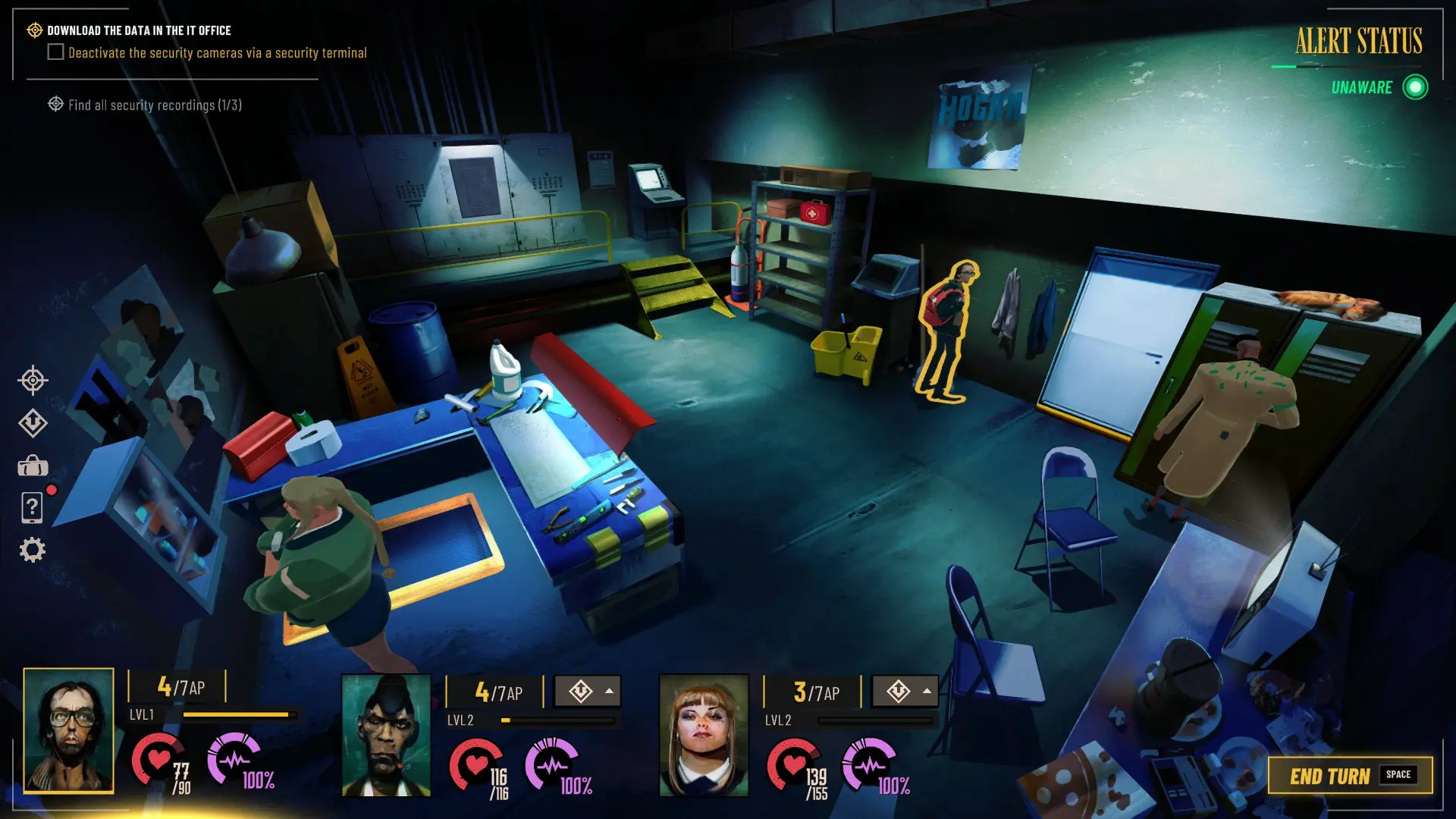
First of all, Sunday Gold is a pure turn-based game. Both in the adventuring/exploration part and in the combat part (more about them, below), everything is played out in turns and depends on Action Points (AP). Each hero has 7 points, which are spent every time they perform an action, except for the very basic ones (movement, examine, enter door, access computer, etc.). For example, if we have opened a box and want to search its contents, this action costs some AP (from 1 to 3). The same happens if we want to pick up an item, which is placed in our inventory accordingly, depending on what it represents (equipment, consumables or key items). APs are replenished at the end of each turn, which we choose the time it ends and when we decide to do so, then the enemy movements are interspersed, which take place in the background and we do not witness them. As a consequence of these, the alarm status is affected, either with a positive or negative way, depending on the result of their movements, which the higher it is, the more likely they are to "jump on us", so we will have to fight.
So, we will often waffle on whether to spend AP to see what's in that locker, risking to increase the Alert level after the turn is over, or ignore it, so we have enough AP for later, but possibly losing useful items like painkillers, armor vests, special ammos etc. The truth is that in the beginning this is not much of a problem, as we often get the positive message from the radios that "everything is going well", a development that lowers the alert level, so we can comfortably leave no inch unexplored. However, as we progress through the game, and particularly in the final chapter, the alarm is an additional headache.
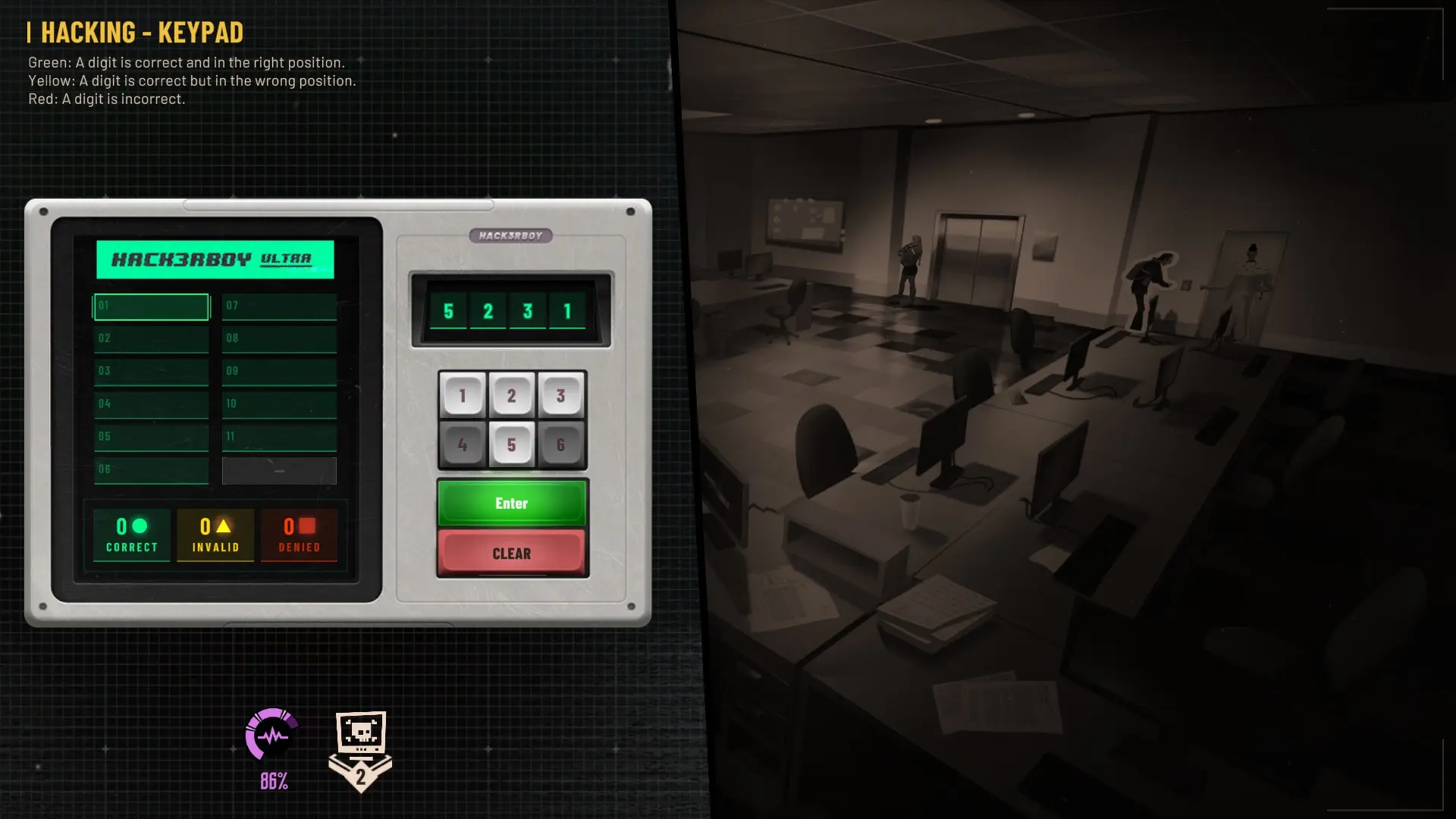
An important aspect is that each hero specializes in a certain field and is the only one who can perform the specific action. Therefore, we have to be a bit careful which character we use each time for simple and common actions (such as search). Gavin is an expert at hacking and operating all kinds of automated machinery, Frank is a specialist in picking locks and breaking into safes, and Sally has great muscle strength, so if something heavy needs moving or destroying, she's our (wo)man. Successfully performing such a special action depends on completing a mini-game, different for everyone. Frank and Sally have an (easy, don't worry) reflex game, while Gavin is tougher and we have to complete a mastermind game. It's worth mentioning that the degree of difficulty of a mini-game also depends on the level of each hero and whether we have placed points in the corresponding skill. Um what, we play an RPG, there will be no experience points and skill trees?
Experience points increase every time you complete an objective, main or secondary (there are a few, but don't imagine any hell) and with winning battles, of course. Each protagonist has their own combat strengths and weaknesses, which are key elements during battles. Gavin, is by far the weakest, but he does great against mechanical enemies with his tech skills, Sally is best in hand-to-hand combat, but is also an excellent healer, while Frank, is an artisan with both knives and guns and as the leader, he inspires the others and is the coolest of all. The last characteristic was not mentioned by accident, as one parameter that greatly affects the game is the Composure meter.
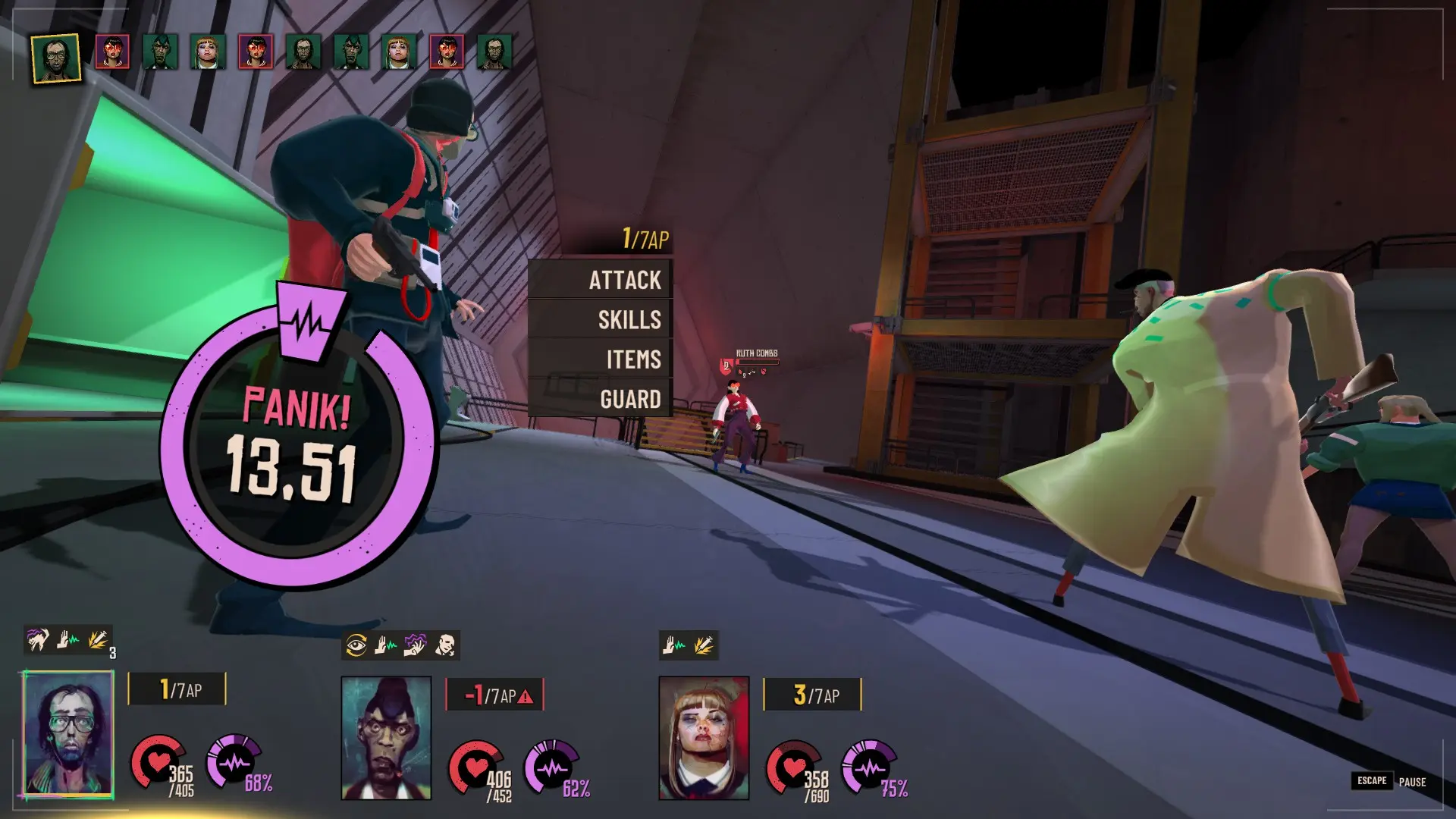
All people have a phobia. So it's the same here, where each member of the group has a specific phobia of something (e.g. Frank in dogs) that affects everyone's composure meter, which if it drops below 80%, then they start behaving erratically. Gavin is by far the most "sensitive" of the three, as he has a problem with the sight of blood - he generally has zero self-confidence and is also afraid of his own shadow, so we have to be extra careful not to take on the more... bloody jobs (such as investigating a mutilated corpse). However, the correlation between Composure and Alert Level is direct, so if after finishing a turn we get bad news from the radios, then Composure's downfall (especially Gavin's) is inevitable. Fortunately, there are several ways to replenish it, but they usually cost in AP or items.
Of course, Composure also affects the battles, which are in line with the standards of a turn-based JRPG and are perfectly functional. The Action Points we have up to that point are one of the primary regulators of battles, so if, for example, Frank had 2 AP before the battle started, that's how many he'll have at the start of it. Whenever a member of our team's turn comes, we can simply attack with one of the two (usually) weapons we wield, use a special skill (but which may take more than one round to perform), consume an item (for health & composure replenish or to throw a grenade), or defend, which raises the APs for the next turn by a percentage. However, if a party member is panicking due to low composure, then we have limited time to act (from 15 seconds to 5 if they're close to dying from stress) and if we take too long to decide, then we lose control of our character and they start going berserk.
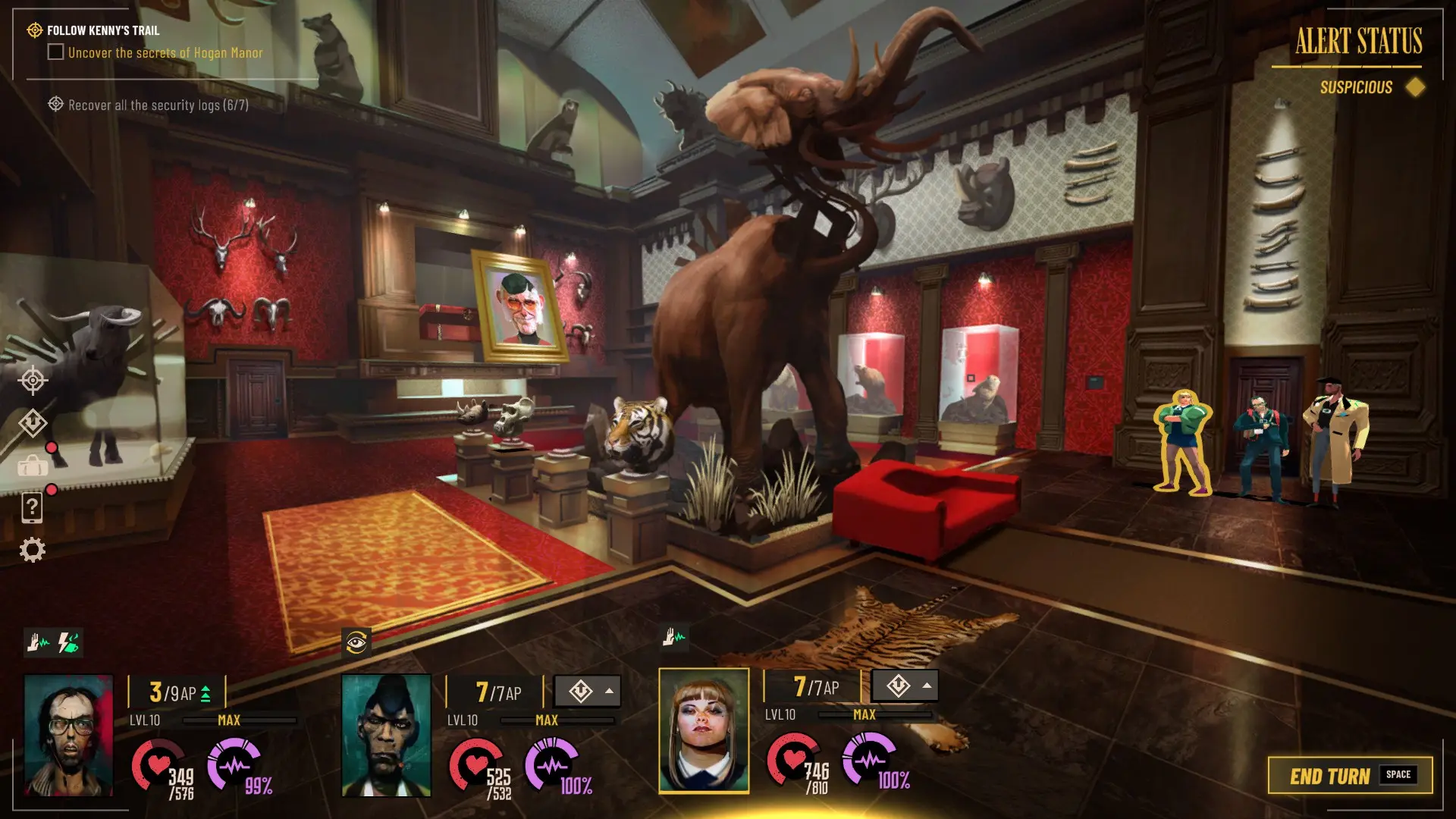
Of course, the combat system is regularly enriched with even more goodies, such as various weapons and add-on enchantments, buffs/debuffs that affect the performance and success rate of both enemies and our team (RNG is omnipresent), and more specialized skills that make a big splash during boss-fights. Overall, the system has taken a lot of cues from our Japanese friends, which makes it quite familiar and undoubtedly effective, as it's something that's been thoroughly tested.
The issue the battles face is the rather uneven distribution in their level of difficulty. At the beginning things are quite difficult and especially the first boss, it takes a while to defeat, and it's a good idea to be stocked up on consumables to get away with it. Then as the heroes gain stronger skills and go up significantly in HP, most battles are accessible and in occasions, quite easy. Limiting the maximum possible level to 10 helps keep the game from becoming a walk in the park, however we would have liked a little more attention to the progression of the battles.
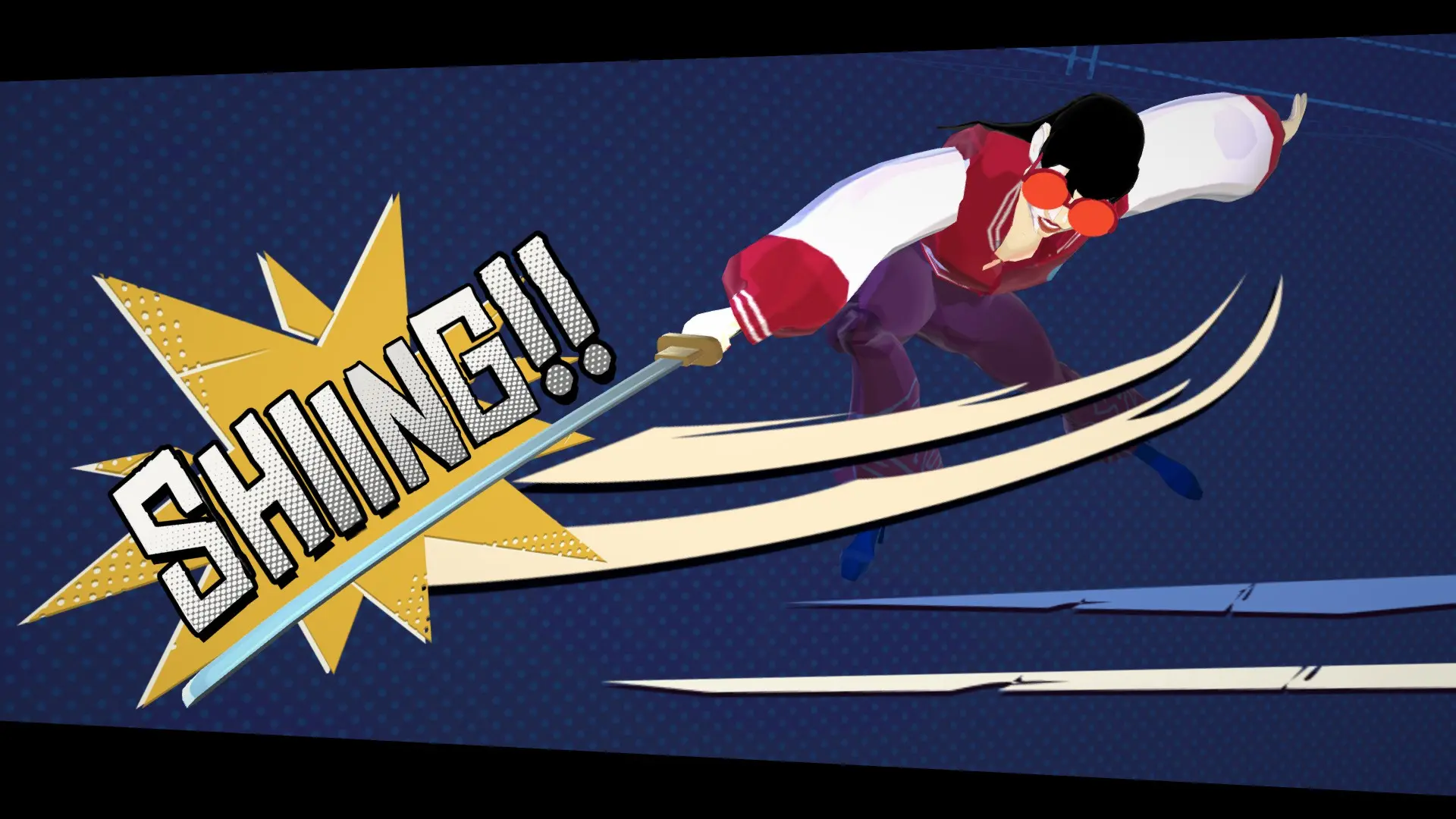
Besides, if we wanted something to exist in Sunday Gold it is a lighter "gamey" sense. What do I mean? There are three chapters, rich in challenges and puzzles (some quite imaginative and adventure-style), which can take about 15 hours to complete, but all crammed into small spaces and situations. It doesn't convincingly depict that we are living and moving in a vast and huge city, as London (will be) in 2070, instead we are just participating in three different levels of a game. This is probably a choice of their developers for narrative purposes, yet Sunday Gold seems to be 'crying out' for richer content. Either in the form of more optional missions that would offer the appropriate loot (risk & reward) or with a stronger element of randomness in terms of adventuring.
It follows that the items we can collect in each mission are fixed, as are the situations we will face. There are two or three cases of alternative paths, but they lead to the exact same result. In my opinion, Sunday Gold, had the potential to turn into a large scale, Disco Elysium level, RPG and sweep everything in its path. After all, the ideas are there, the writing is neat and the adventure/RPG hybrid that works very well, except perhaps for the tedious repetition of the same mini-games towards the end of the story.
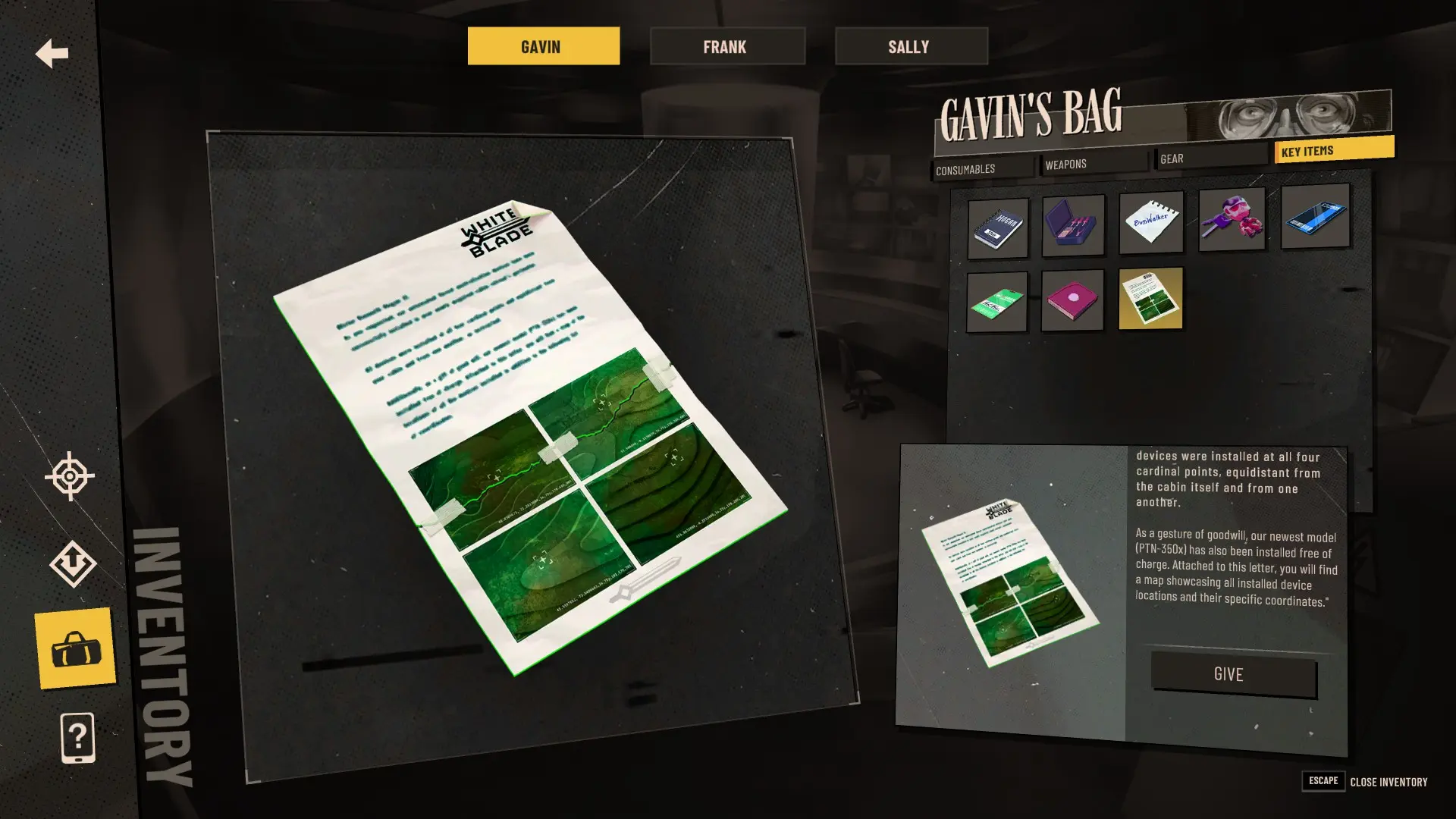
Obviously though, budget is the well-known pitfall in small productions, when we are faced with such nice ideas and implementations. This can be seen in the scant animation included in the game, or rather in the lack of it, especially in the frugally drawn models of the characters being asked to perform an action. They are simply... "teleported" to where we point them to, with the overlay of said event being implemented with a nice effect that a problematic security camera would do. In essence though, this isn't a serious flaw in the game, after all, Sunday Gold isn't aiming to impress anyone with its technical aspects, no matter how much it boasts such a strong art style and an equally commendable atmospheric soundtrack.
It aims to provide an entertaining turn-based game that simultaneously tells a well-written story (though not particularly original), offers a robust combat system, and challenges the player's brain cells with both its puzzles and the constant weighing of decisions. Sunday Gold succeeds and satisfies in the double-digit hours it can keep the player occupied, and hopefully it will be the springboard for a sequel on a larger scale. After all, Frank, Sally and Gavin deserve it.
RATING - 78%
78%
Dystopian Style
Stylized, with several doses of tactics and familiar battle system, Sunday Gold is an interesting experiment that could achieve more.










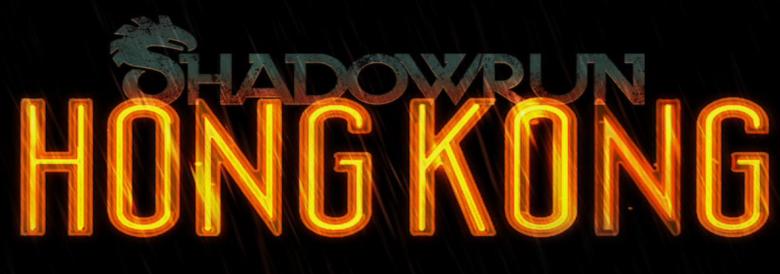
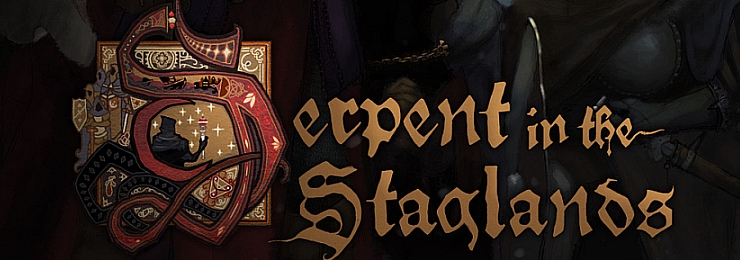
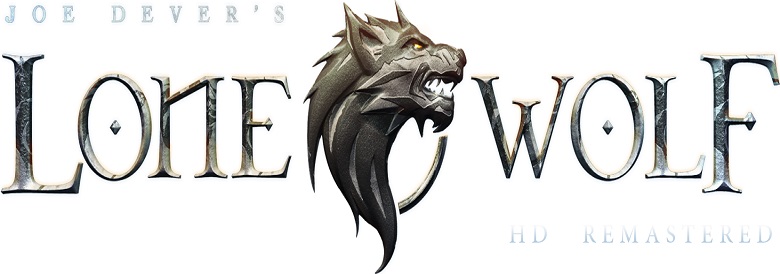


Να’σαι καλά ρε Ζώρζ, μου γλίτωσες λεφτά! Το ντέμο μου είχε φανεί συμπαθές αλλά ‘λίγο’ και τα γραφόμενά σου επιβεβαιώνουν την υποψία μου.
Ίσως για νεότερους που ακόμη έχουν ανοχές για ποιοτικές μετριότητες.
Εν τω μεταξύ, σήμερα έφαγε αναβολή η κυκλοφορία του για ένα (!) μήνα. Άγνωστο γιατί (δεν ξέρω αν έχει σχέση με το θάνατο της Λιζ), αλλά δύσκολα θα αλλάξουν πολλά πράγματα.